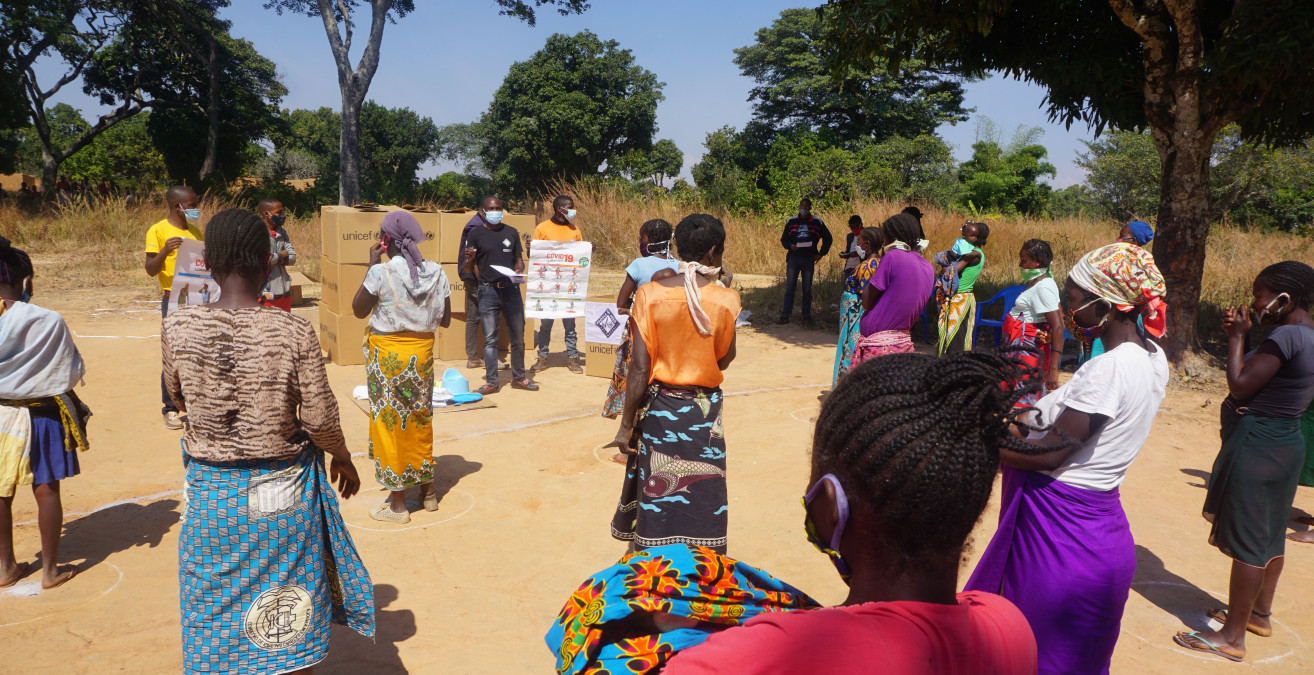Supporting vulnerable families in Angola during the COVID-19 pandemic
Published: Jun 4, 2020 Reading time: 3 minutes Share: Share an articleCircles drawn on the floor marked the required distance that the villagers of Sachonde, in Angola’s Bié province, were asked to maintain during an awareness-raising session on COVID-19 held in May. The session addressed topics such as the correct use of facemasks, the importance of handwashing, and the modes of transmission of the new coronavirus.

People in Need (PIN) has been working to promote good hygiene and sanitation practices in Angola since 2010; integrating information on COVID-19 into our existing work has been one practical way of helping to contain the pandemic in the country. In addition to raising awareness, PIN has been distributing hygiene kits consisting of items such as buckets, soap, water purification tablets, and sanitary pads. Food items, like sugar and oil, have also been delivered.
These activities are part of a project implemented in partnership with UNICEF Angola, which integrates the Water, Sanitation, and Hygiene (WASH) sector with the nutrition sector to reduce malnutrition in Bié. Priority beneficiaries include women, especially heads of households, the elderly, and women with disabilities. Ana Maria Hossi, recipient of a hygiene kit, says “we are grateful for the kit and the presentation. Our community really needs this aid, and the food and hygiene materials will help us protect ourselves from this disease.”
Gift Zuze, PIN’s WASH Programme Manager in Angola, adds that “in the current context, where all countries, including Angola, are searching for ways to control the spread of the coronavirus, proper hygiene practices are essential. And the demonstrations on handwashing that we do in the villages provide useful and timely information.”
Different context, same objective
In December 2019, before COVID-19 reached pandemic levels, dozens of residents of Bomba, another village in Bié province, gathered to receive hygiene kits from PIN. That distribution looked quite different from the current activity, with its distancing and hygiene requirements. But regardless of outward appearances, the objective – then and now – is to support vulnerable families.
Angelina Roberto, a widow who cares for 13 family members, received one of the kits in Bomba. “It’s going to help a lot,” she says. “I couldn’t get it otherwise, because I only get money to buy fuba [a flour used to cook one of the most common dishes in Angola] for my family, a bar of soap, and a toilet soap once in a while. This kit is new to me, and I’m very grateful.”
Tackling malnutrition
The project also includes training for community health providers, to teach them how to conduct nutrition screenings, refer cases of concern to the appropriate healthcare facility, and provide home counselling. Additionally, the project provides trainings for health professionals on the national guidelines for the treatment of malnutrition, sessions that PIN coordinates in partnership with governmental health institutions.
As a result, more than 13,000 children have been screened in 91 villages of the Kuito, Catabola, and Chinguar municipalities. During this portion of the program, approximately 700 cases of malnutrition were identified and 1,500 hygiene kits were distributed. In 23 of the villages, water points were rehabilitated to provide access to clean water.
No one left behind
To ensure that no one is left behind during the pandemic, hygiene kits were also distributed to leprosy patients in Kuito municipality. “This bucket will help us with handwashing,” says Francisco Ebambi, referring to one of the items in the kit.
Though this action isn’t officially part of the project, it is an attempt by the WASH team to help as many people as possible during the pandemic. Zuze emphasizes the importance of this work: “This activity means a lot to us, because it shows the effort we are making to help all populations adopt proper hygiene and sanitation practices.”



